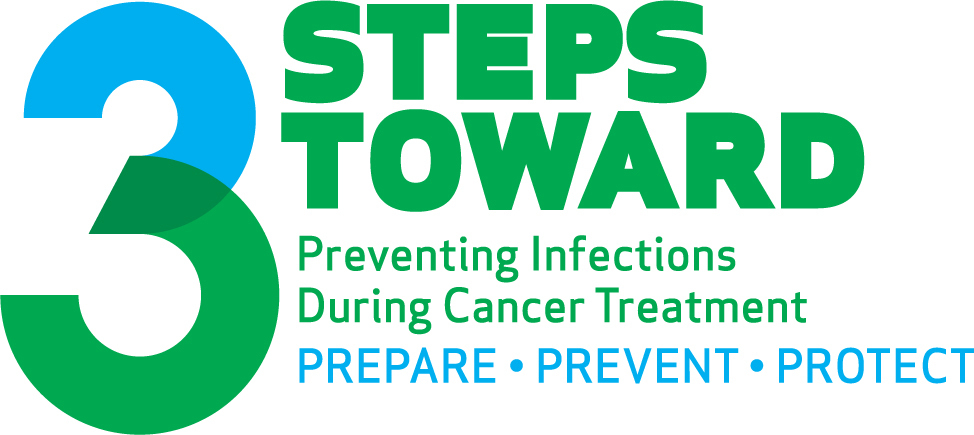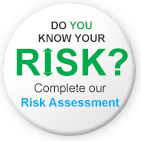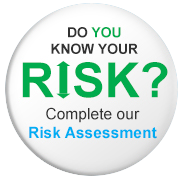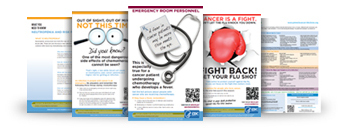
Health Tip Sheet
Basic Hygiene Practices During Chemotherapy
Hand Washing
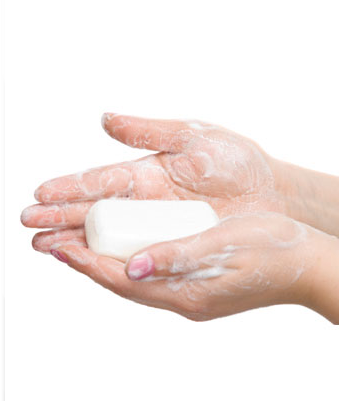
One of the best ways to keep yourself from getting sick is to keep your hands clean. You should also encourage friends and family members to keep their hands clean. Let’s take some time to learn more about when and how to wash your hands.
When to Wash Your Hands

Wash your hands with soap and water:
- Before, during, and after cooking food
- Before you eat
- After going to the bathroom
- After changing diapers or helping a child to use the bathroom
- After blowing your nose, coughing, or sneezing
- After touching your pet or cleaning up after your pet
- After touching trash
- Before and after treating a cut or wound or before caring for your catheter, port or other access device.
How To Wash Your Hands
Chemotherapy and the Mouth
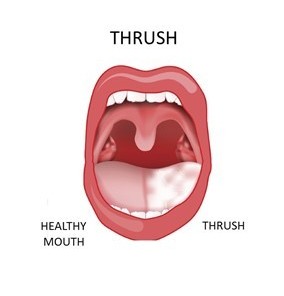 The medicine that you are taking to treat your cancer has an effect on the way the cells in your body make new cells. When the healthy cells in your mouth are affected, this can lead to a number of side effects.
The medicine that you are taking to treat your cancer has an effect on the way the cells in your body make new cells. When the healthy cells in your mouth are affected, this can lead to a number of side effects.
Tongue: Your cancer medication can reduce the number of infection-fighting cells in your blood for a short period of time, and during this time your body’s ability to combat infection may be lowered. Because of this, you are more likely to get an infection in the lining of your mouth. The most common of these infections is a fungal infection called thrush. Thrush usually appears as a white coating in the mouth and on the tongue.
Gums: There are times that the medicine you are taking may cause your gums to become sore and bleed.
Soft palate: Because of your medicine, your mouth may become very sore, causing small ulcers to form. This soreness is called mucositis and can be very painful.
Mouth: Just as your medicine may affect the lining of the mouth, it can also have an impact on the glands that make your saliva. This can cause you to have dry mouth.
Keeping Your Mouth Healthy

There are a number of things that you can do to keep your mouth healthy:
- Brush your teeth and clean your dentures when you wake up, before you go to bed, and after every meal.
- Use a soft toothbrush.
- Get a new toothbrush every 3 months.
- Use the mouthwash your doctor or nurse recommends to avoid getting mouth sores.
- If you do develop mouth sores, speak to your doctor about whether to substitute mouthwash for salt or plain water mouth rinses, as this will cause less discomfort.
- Check with your doctor or nurse before flossing your teeth because your chemotherapy may increase your chances of bleeding when you floss.
- Avoid using toothpicks.
- Try to stay away from things that may irritate your mouth: alcohol, tobacco, spicy food, garlic, onion, vinegar, crunchy foods, and acidic drinks (e.g., orange and grapefruit juice).
More Tips for Keeping Your Mouth Healthy
 Here are some additional things that you can do to keep your mouth healthy:
Here are some additional things that you can do to keep your mouth healthy:
- Keep your lips moist by using lip balm.
- Try to drink at least eight glasses of fluid a day.
- Check your mouth daily for redness, swelling, sores, white patches, or bleeding, and let your doctor or nurse know if any of these signs of infection are present.
- Check with your doctor or nurse before having any dental work done
Skin Changes, Skin Care and Bathing
The medicines that you take to treat your cancer may cause your skin to change in a number of ways. These changes, like dry skin and irritation, can lead to openings in the skin where germs can enter and infection can set in. A few changes to your daily hygiene routine as soon as chemotherapy begins and throughout your treatment can help to keep your skin healthy and lower your risk for infection. An important part of this routine is bathing.
Skin Care and Bathing
Following the tips below will help protect your skin from damage and infection:
- Bathe every day and use warm water.
- Avoid soaking in spas or hot tubs.
- Use a mild soap for bathing.
- Use a soft towel to gently wash skin.
- Be sure to clean feet, groin, underarms, and other sweaty areas well.
- Do not rub skin with the towel, instead pat it dry.
- Do not share bath towel with other family members.
- Use unscented lotion or moisturizing cream on skin after it has dried completely.
Protecting Skin From Cuts, Scrapes, Injury and Infection
While you are going through chemotherapy, your body will not be able to fight germs off as well as it normally would. At every step of your treatment, it is important to protect yourself from getting an infection. One of the ways you can do this is by protecting your skin from cuts and scrapes because these are easy ways for germs to enter your body.
If you follow a few simple steps you can protect yourself from injury and infection:
- Use an electric razor instead of a blade when shaving to prevent nicks.
- Be careful when handling sharp items.
- Wear gloves when gardening to protect your hands from cuts and scrapes.
- Use caution when exercising to avoid grazing or scraping your skin.
- Use caution when walking on wet or slippery surfaces to avoid falling and scraping your skin.
- Do not cut, tear, or bite cuticles.
- Avoid manicures and pedicures.
- Do not squeeze or scratch pimples.
- Wear clothing that is appropriate for the type of activity you plan to do (for example, wearing long sleeves and gloves when gardening).
Wound Care
How to Care For a Wound
When to Call Your Doctor or Nurse
Any time you change a bandage you should check for signs of infection. Call the doctor or nurse if you notice any of the following:
- Drainage, especially if it is yellow in color
- Odor coming from the wound
- Redness in skin around the wound
- Swelling of the skin around the wound
- Pain or tenderness
